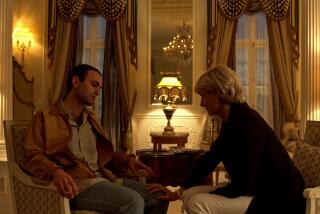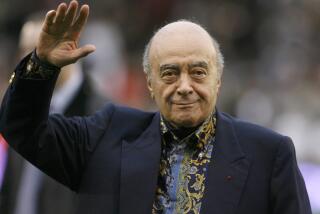British Coroner to Investigate Theories on Diana’s Death
- Share via
LONDON — A British coroner promised Tuesday to examine all theories surrounding the 1997 Paris car crash that killed Princess Diana, an accident French investigators blamed on reckless driving by a drunk chauffeur but others contend had more sinister causes.
Opening Britain’s first investigation into the accident, Royal Coroner Michael Burgess ordered Scotland Yard police to gather evidence concerning long-standing rumors that include suggestions that the royal family was behind Diana’s death.
Under British law, coroners are required to conduct inquests into the deaths of British citizens who are killed abroad. Burgess said he could not proceed until now because French investigations only recently concluded.
Speculation has run rampant about what caused Diana’s chauffeur-driven Mercedes to hurtle into a pillar in a Paris underpass as she and her boyfriend, Dodi Fayed, were pursued by a group of paparazzi photographers.
The collision killed the princess, Fayed and Henri Paul, the driver who was employed by Fayed’s wealthy father, Mohamed Fayed.
French investigators said Paul was driving too fast while high on alcohol and pills.
But conspiracy theorists have never accepted that explanation. Their suspicions have fermented in the six years since the accident, in no small measure because of hints from Diana.
The latest “clue” dropped Tuesday, when London’s Daily Mirror newspaper revealed that Diana suspected her estranged husband, Prince Charles, was scheming to kill her in the months before her death.
“This particular phase in my life is the most dangerous,” Diana wrote in a note to her butler, Paul Burrell, 10 months before her death. “My husband is planning ‘an accident’ in my car, brake failure and serious head injury, in order to make the path clear for him to marry.”
The note’s existence was revealed in October, when the Mirror published a photograph of it to back up its lucrative serialization of “A Royal Duty,” Burrell’s book about his years with Diana. At the time, the Mirror and Burrell’s publisher blacked out the name of the person Diana accused of plotting against her.
The newspaper’s editor, Piers Morgan, defended the decision to publish the name Tuesday because the full contents of Burrell’s note would have been made public during the inquest. Morgan said he considers the suggestion that Charles would kill Diana to be “preposterous,” a view echoed by others in royal circles.
“We could have guessed what Diana thought -- and who cares what she thought?” historian Hugo Vickers said in an interview. “There is an unbelievable amount of rubbish floating around.”
Still, Diana accusing Charles was oxygen for those who refuse to accept that the princess died in anything as mundane as a traffic accident.
Among the doubters is Mohamed Fayed, who owns London’s famed Harrods department store. Fayed has insisted that the couple were murdered by British security services, acting on the orders of a royal family determined to prevent the princess from marrying a Muslim.
“This is absolute, black-and-white, horrendous murder,” Fayed told reporters Tuesday after the coroner opened a separate inquest into his son’s death. Fayed charged again that Charles and his father, Prince Philip, masterminded the crash.
Burgess said Tuesday that he would conduct no hearings until next year at the earliest -- after he receives reports from Scotland Yard and studies 6,000 pages of documents compiled by French authorities during their lengthy judicial probe.
The coroner appeared sensitive to the risk that his inquest could be perceived as a whitewash.
“I am an independent judicial officer, which means I am independent of the families of those who have died and independent of those who have appointed me,” he said.
Yet he also must “separate fact from fiction and speculation,” Burgess said.
“I am aware that there is speculation that these deaths were not the result of the sad but relatively straightforward road traffic accident in Paris,” Burgess said to a huge media contingent assembled in a cavernous London convention center.
But, he added, “speculative reports are not themselves evidence, however frequently and authoritatively they may be published, broadcast or repeated.”
More to Read
Sign up for Essential California
The most important California stories and recommendations in your inbox every morning.
You may occasionally receive promotional content from the Los Angeles Times.













